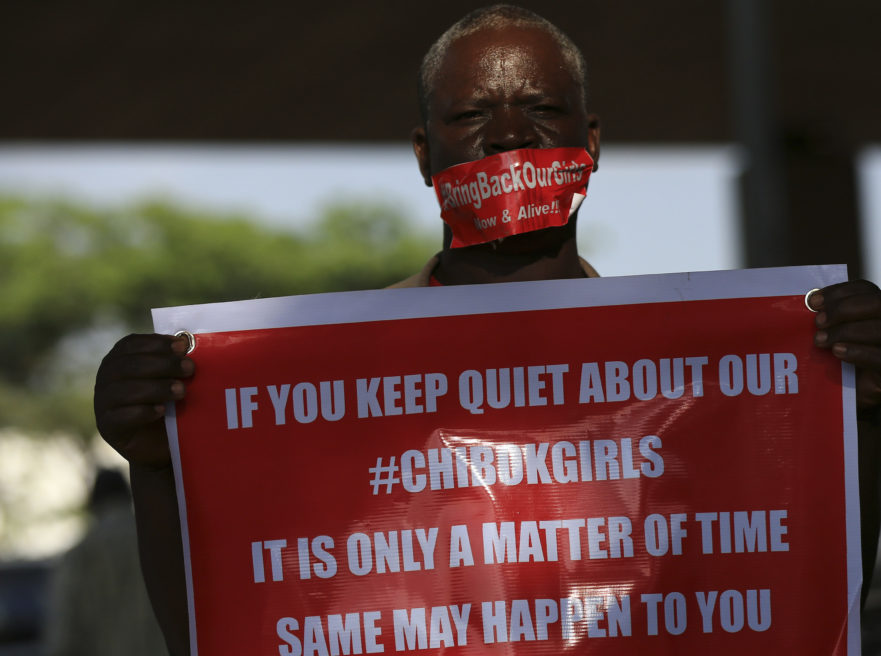Sunday, April 14, marks the day five years ago that Boko Haram kidnapped 276 Chibok schoolgirls in Borno State, Nigeria. Fifty-seven girls escaped in the first 24 hours, and in the last five years, 164 girls have been found, escaped, or were released after negotiations. Sadly, the terrorists still hold 112 Chibok girls, including Dorcas. At 15 years old that Sunday, she was one of the youngest of the Chibok girls kidnapped from the Chibok secondary government school.
Dorcas’ parents, Esther Yakubu and Yakubu Kabu, learned about their daughter’s fate when they saw her featured in a 2016 Boko Haram “proof of life” video. She was the only girl who spoke. She asked her parents to beg the Nigerian government to agree to Boko Haram’s demands so that all the Chibok girls could return home. “There is no suffering we have not seen,” she said.” “Tell the government to give them their people so we can come to be with you. Our sisters are injured. Exercise patience as we also have endured.”
I met Esther and Kabu in Nigeria twenty months after Dorcas and the other schoolgirls were kidnapped. Shortly thereafter, Ladi bravely travelled to the United States to speak publicly about what Boko Haram had done, the first Chibok parent to do so.
One year later, in May 2017, Dorcas appeared in another video. But this time her message was different. Holding an AK-47 rifle, Dorcas stated she did not want to return home because her parents live in a town of unbelievers and they are not fulfilling Allah’s wishes. This video tortured Ladi and Kabu. They refused to believe that their daughter willingly had uttered these words.
The Chibok schoolgirls’ abduction is the most high-profile of Boko Haram kidnappings. It prompted an international outcry. However, an estimated 4,000 girls, boys and women have been abducted since 2009, many of whom still are missing.
On the eve of the fifth anniversary I asked Esther if she had any updates on Dorcas. “We have not heard anything from the government for a long time. I want Americans to please help us rescue our girls. Plead with the Nigerian government to rescue our girls. We talk, meet, and pray with parents of the missing girls. It is difficult. Our other children have not accepted that Dorcas is gone. They still talk about her.”
The Chibok mass abduction helped launch the “Bring Back Our Girls Movement” (BBOG) in Nigeria. This advocacy group recently faulted the Nigerian government for not doing enough to ensure the remaining girls’ release. For five years BBOG has organized a daily sit-in at Abuja, the country’s capital; weekly sit-ins in Lagos; and events in Ibadan, Osogbo, London, New York and Washington, DC. They have visited local and international stakeholders to demand justice for the slain, safe schools and the launch of the National Missing Persons Register. BBOG will hold an overnight vigil on April 14th at the Nigerian Embassy in New York City as well as vigils in Lagos, Abuja, London.
Over the past five years civil society and faith-based groups in the U.S. and around the world have launched petitions, social media campaigns, and written letters to raise awareness about the Chibok girls. There have been hearings and events in the U.S. Capitol led by Representatives Chris Smith (R-NJ) and Frederica Wilson (D-FL), among others.
Senators Tammy Baldwin (D-WI) and Marco Rubio (R-FL) on April 11th introduced a bipartisan resolution recognizing the fifth anniversary, and calling on the Nigerian government to prioritize the recovery of women and girls Boko Haram abducted and enslaved and the governments of the United States and Nigeria to swiftly implement measures to defeat Boko Haram.
These and other efforts help Esther and Kabu and the other parents know they are not alone in working to free Dorcas and the many others Boko Haram has abducted. However, much of the West has responded with indifference. We seem to have lost momentum. The latest tragedy spawns headlines and grabs our attention leaving us weary and conflicted on what to champion. Yet, in addition to abductions, Boko Haram has murdered tens of thousands of Christians and Muslims, destroyed hundreds of churches and mosques, and displaced millions. Communities have been disrupted and economic development has been stunted. A U.S. Special Envoy is urgently needed for Nigeria and the Lake Chad region.
Let this fifth anniversary be the last before Dorcas and the others return home and are reunited with their families. Fortunately, some things can be done, including Congress taking actions against Boko Haram and the Administration appointing a Special Envoy to Nigeria and the Lake Chad region and adopting cross-agency policies that confront Boko Haram head on and help defeat this scourge on Nigeria.
Lou Ann Sabatier, Director of Communications, 21Wilberforce
(Photo credit: Reuters-Afolabi Sotunde)

